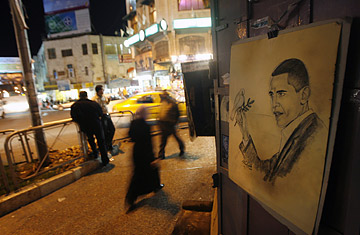
Palestinians walk past a drawing of U.S. President-elect Barack Obama in the West Bank city of Ramallah
Four elections to be held over the next year in the Middle East and its outer fringes — all of them potentially affected by Barack Obama's historic win on Tuesday — could substantially alter the region's troubled dynamic. Obama's victory will be, rightly or wrongly, viewed by many abroad as heralding a tectonic shift in U.S. foreign policy. And that perception could shape the outcome of a number of different races across the troubled region in ways that could affect long-term U.S. goals, for better and worse. (Read "The World's View of Obama's win.")
Israel goes to the polls on Feb. 10 to elect a new Prime Minister and parliament; voters in Iran will choose a new President on June 12; and Iraq will hold provincial elections next January, followed by a national election late in 2009. Afghanistan is slated to hold new presidential elections next fall.
Herewith, a survey of the dynamics in each:
Israel: Recurring Deadlock?
Political paralysis over the terms of a peace deal with the Palestinians was
one of the key factors that prevented Israel from forming a new government after a corruption scandal forced out Prime Minister Ehud Olmert. His
putative successor, acting Prime Minister Tzipi Livni, failed to forge a
majority coalition after a key prospective partner refused to allow any
negotiations over the status of Jerusalem. Even Olmert has acknowledged
that no two-state solution is possible without sharing the Holy City, which
both sides claim as their capital. So fractured is the Israeli political
consensus, however, that it's quite possible that February's election will
fail to break the impasse. Israel's proportional representation system means that even if Livni does manage to
fend off the powerful challenge of right-wing former Prime Minister Benjamin
Netanyahu, she may still lack a majority capable of forcing through a peace
agreement that will ignite fierce, and probably violent, resistance from
militant right-wing West Bank settlers. Israeli democracy has not given any
political party or politically coherent bloc a clear majority in parliament
since 1992.
Peace with the Palestinians, however, may not be the primary security concern on the minds of Israeli voters. Iran's nuclear program is seen as far more menacing than any threat currently emanating from the Palestinians. So, while a majority of voters may incline more toward Livni's two-state approach to peace with the Palestinians, it could yet be swayed by Netanyahu's more hawkish stance on Iran. And then there's the Obama factor. Given Obama's stated preference for dialogue with Tehran, many in Israel are concerned that his Administration may lower the pressure on the regime. If Obama's victory has left Israelis uncertain about the intentions of his Administration, they may be more inclined to elect Netanyahu, a hawk with a track record of going around a U.S. President to appeal to pro-Israel sentiment in Congress when he didn't like what he was hearing from the Clinton Administration. Conversely, an expectation that the U.S. is looking to ease its security burdens in the wider region may prompt Israeli leaders to renew peace efforts, as they did in the period that saw the Cold War end and the U.S. seek broad Arab support for the Gulf War.
